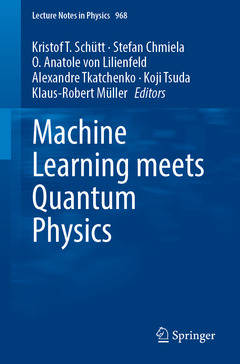Description
Machine Learning Meets Quantum Physics, 1st ed. 2020
Lecture Notes in Physics Series, Vol. 968
Coordinators: Schütt Kristof T., Chmiela Stefan, von Lilienfeld O. Anatole, Tkatchenko Alexandre, Tsuda Koji, Müller Klaus-Robert
Language: English
Subject for Machine Learning Meets Quantum Physics:
467 p. · 15.5x23.5 cm · Paperback
Description
/li>Contents
/li>Biography
/li>Comment
/li>
To overcome this challenge, recently there have been increased efforts to accelerate quantum simulations with machine learning (ML). This emerging interdisciplinary community encompasses chemists, material scientists, physicists, mathematicians and computer scientists, joining forces to contribute to the exciting hot topic of progressing machine learning and AI for molecules and materials.
The book that has emerged from a series of workshops provides a snapshot of this rapidly developing field. It contains tutorial material explaining the relevant foundations needed in chemistry, physics as well as machine learning to give an easy starting point for interested readers. In addition, a number of research papers defining the current state-of-the-art are included. The book has five parts (Fundamentals, Incorporating Prior Knowledge, Deep Learning of Atomistic Representations, Atomistic Simulations and Discovery and Design), each prefaced by editorial commentary that puts the respective parts into a broader scientific context.
Introduction to Material Modeling.- Kernel Methods for Quantum Chemistry.- Introduction to Neural Networks.- Building nonparametric n-body force fields using Gaussian process regression.- Machine-learning of atomic-scale properties based on physical principles.- Quantum Machine Learning with Response Operators in Chemical Compound Space.- Physical extrapolation of quantum observables by generalization with Gaussian Processes.- Message Passing Neural Networks.- Learning representations of molecules and materials with atomistic neural networks.- Molecular Dynamics with Neural Network Potentials.- High-Dimensional Neural Network Potentials for Atomistic Simulations.- Construction of Machine Learned Force Fields with Quantum Chemical Accuracy: Applications and Chemical Insights.- Active learning and Uncertainty Estimation.- Machine Learning for Molecular Dynamics on Long Timescales.- Database-driven High-Throughput Calculations and Machine Learning Models for Materials Design.- Polymer Genome: A polymer informatics platform to accelerate polymer discovery.- Bayesian Optimization in Materials Science.- Recommender Systems for Materials Discovery.- Generative Models for Automatic Chemical Design.
Kristof T. Schütt studied computer science at the Technische Universität Berlin where he received the MSc. in 2012 and the Ph.D. degree in 2018.
During his doctoral studies in the machine learning group of TU Berlin and at the Berlin Big Data Center, his research interests has been representation learning of atomistic systems, in particular the development of interpretable neural networks for applications in quantum chemistry.Dr. Schütt has continued this research in a postdoctoral position at the Berlin Center for Machine Learning.
O. Anatole von Lilienfeld is Associate Professor of Physical Chemistry at the University of Basel. Research in his laboratory deals with the development of improved methods for first principles based sampling of chemical compound space using quantum mechanics, super computers, Big Data, and machine learning.
Previously, he was an associate professor at the Free University of Brussels. From 2013 to 2015 he was a Swiss National Science Foundation professor at the University of Basel. He worked for Argonne and Sandia National Laboratories, and from 2007 to 2010 he was a distinguished Harry S. Truman Fellow at Sandia National Laboratories, after postdoctoral work at New York University and at the University of California Los Angeles. In 2005, he was awarded a PhD in computational chemistr
These books may interest you

Simulations in Nanobiotechnology 71.13 €



